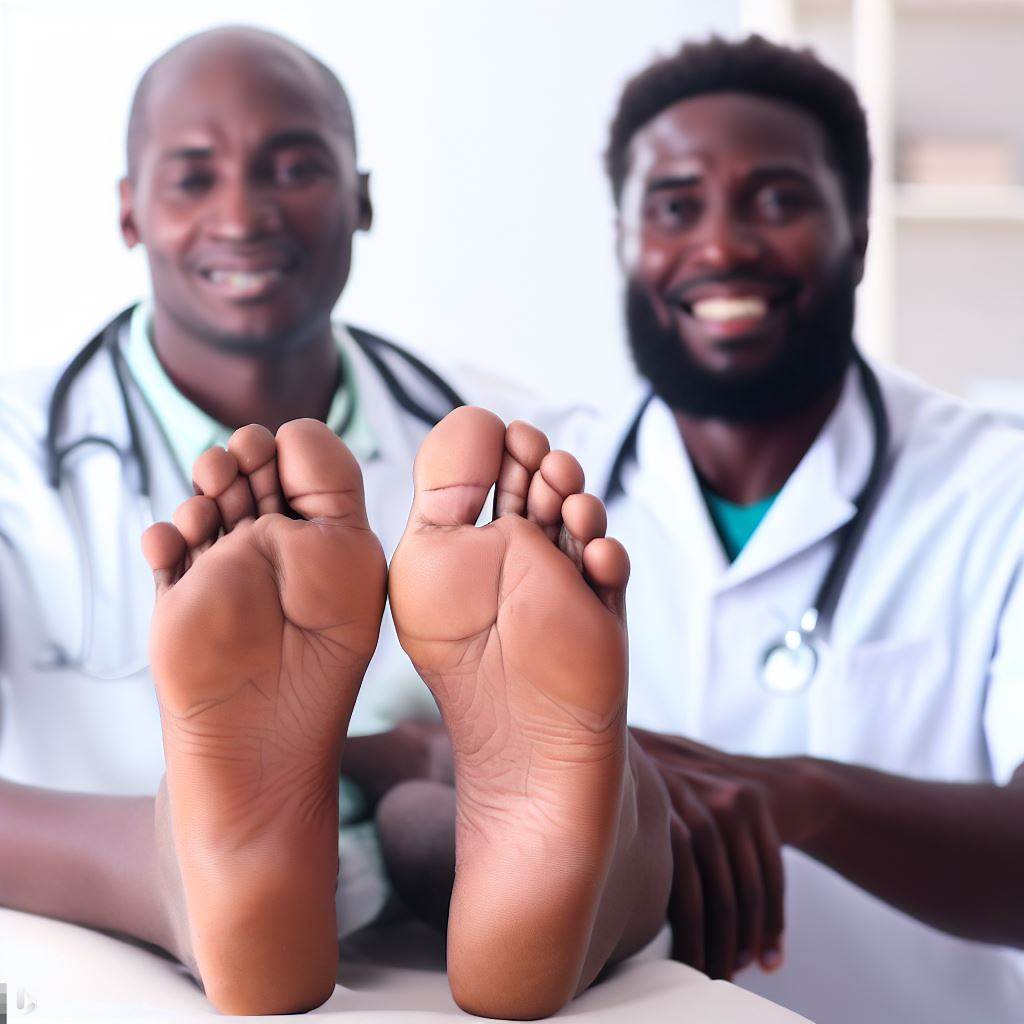Introduction to Podiatry
Definition and scope of podiatry
Podiatry is a branch of medicine that focuses on the diagnosis, treatment, and prevention of foot and lower limb disorders.
It includes conditions such as foot deformities, injuries, infections, and biomechanical abnormalities.
Importance of foot health
Foot health is crucial as it impacts our overall well-being. Healthy feet allow us to walk, run, and perform daily activities without pain or discomfort.
Neglecting foot health can lead to more serious problems like infections or mobility issues.
Overview of podiatry in Nigeria
Podiatry is still an emerging field in Nigeria, with limited awareness and resources. However, the importance of foot health is gaining recognition, and there is a growing demand for podiatric services.
The scope of podiatry in Nigeria extends from routine foot care to advanced treatments and surgeries.
Podiatrists in Nigeria undergo specialized training to diagnose and manage various foot conditions. They work closely with other healthcare professionals to provide comprehensive care for patients.
However, the profession faces challenges such as lack of standardized training programs and limited access to advanced technology and equipment.
Despite these challenges, podiatrists in Nigeria are dedicated to improving foot health and enhancing the quality of life for individuals with foot problems.
They educate the public about the importance of foot care and strive to expand podiatric services across the country.
In the end, podiatry plays a vital role in promoting foot health and addressing foot-related disorders in Nigeria.
As awareness and resources continue to grow, we can expect further advancements in the field, leading to improved foot care for all Nigerians.
Education and Training in Podiatry
Podiatry degree programs in Nigeria
Nigeria offers several universities and colleges that offer podiatry degree programs. These programs provide students with the necessary knowledge and skills to become podiatrists.
Curriculum includes courses in anatomy, physiology, biomechanics, pharmacology, and podiatric medicine.
Students also gain practical experience through clinical rotations and internships. Graduates of these programs receive a Bachelor of Podiatry Medicine (B.P.M.) degree.
In Nigeria, aspiring podiatrists have access to degree programs that equip them with the necessary knowledge and skills.
These programs, offered by various universities and colleges, cover essential subjects such as anatomy, physiology, biomechanics, pharmacology, and podiatric medicine.
Through clinical rotations and internships, students gain practical experience, preparing them for their future careers. Upon graduation, they receive a Bachelor of Podiatry Medicine (B.P.M.) degree.
Accreditation and certification requirements
In order to practice podiatry in Nigeria, graduates must obtain proper accreditation and certification.
Accreditation is provided by the Podiatry Council of Nigeria (PCN), the regulatory body for podiatry in the country.
Applicants must submit their educational transcripts, pass the PCN licensing examination, and fulfill other requirements set by the council.
Once accredited, podiatrists are eligible to practice and provide foot and ankle care in Nigeria.
Continued professional development is required to maintain the accreditation and stay up-to-date with advancements in the field.
To practice podiatry in Nigeria, graduates must meet accreditation and certification requirements. The Podiatry Council of Nigeria (PCN) serves as the regulatory body for the profession.
Applicants must submit their educational transcripts, pass the PCN licensing examination, and fulfill other criteria established by the council.
Once accredited, podiatrists are eligible to provide foot and ankle care in the country. Continuous professional development is vital to maintain accreditation and stay updated with advancements in the field.
Continuing education opportunities for podiatrists
Podiatrists in Nigeria have various opportunities for continuing education and professional growth. These opportunities include attending conferences, workshops, and seminars.
Conferences provide a platform for podiatrists to network with professionals and exchange knowledge and ideas.
Workshops focus on specific areas of podiatry, allowing practitioners to enhance their skills and learn new techniques.
Seminars cover topics such as diabetic foot care, sports-related injuries, and wound management. Podiatrists can also pursue advanced certifications or participate in research to contribute to the field.
For podiatrists looking to enhance their skills and knowledge, Nigeria offers various continuing education opportunities.
Conferences, workshops, and seminars provide platforms for networking, exchanging ideas, and learning about the latest developments in podiatry.
Attending workshops allows practitioners to focus on specific areas of interest, honing their skills and acquiring new techniques.
Seminars cover topics such as diabetic foot care, sports-related injuries, and wound management.
Additionally, podiatrists can opt for advanced certifications or engage in research to contribute to the field’s advancement.
In summary, Nigeria provides comprehensive education and training opportunities for aspiring podiatrists. Degree programs equip students with the necessary theoretical knowledge and practical experience.
Accreditation and certification assure the quality of podiatric care provided in the country. Continuing education opportunities enable podiatrists to stay abreast of advancements and further develop their skills.
With a robust education and training system, podiatry in Nigeria is poised for continued growth and success.
Read: Understanding the Role of Podiatrists in Nigerian Healthcare
Common Foot Conditions in Nigeria
Athlete’s foot and fungal infections
- Athlete’s foot is a common fungal infection that affects the skin between the toes.
- It is characterized by redness, itching, burning sensation, and peeling skin.
- Fungal infections can also occur on the soles of the feet and cause discomfort.
- Keeping the feet clean and dry, using antifungal creams, and wearing clean socks are recommended.
Ingrown toenails
- Ingrown toenails are nails that pierce the skin and grow into the surrounding tissues.
- They can cause pain, redness, swelling, and even infection if not treated properly.
- Wearing proper footwear, trimming nails straight across, and avoiding tight shoes can prevent ingrown toenails.
- Seeking professional help is necessary if the condition worsens or becomes infected.
Corns and calluses
- Corns and calluses are areas of thickened skin that develop due to excessive pressure or friction.
- They usually appear on the feet and can cause pain or discomfort when walking.
- It is important to wear shoes that fit properly, use padding or cushioning products, and keep the feet moisturized.
- If the corns or calluses become painful or infected, seeking treatment from a podiatrist is recommended.
Diabetic foot problems
- Diabetic foot problems are a common complication of diabetes and can range from mild to severe.
- It includes foot ulcers, infections, neuropathy, and poor circulation.
- Regular foot care, managing blood sugar levels, wearing comfortable shoes, and regular check-ups with a podiatrist are essential.
- Early detection and treatment of any foot problems are crucial for diabetic individuals.
Heel pain and plantar fasciitis
- Heel pain is often caused by plantar fasciitis, which is the inflammation of the plantar fascia.
- The plantar fascia is a band of tissue that connects the heel bone to the toes.
- Rest, stretching exercises, wearing supportive shoes, and using orthotic devices can help relieve heel pain.
- If the pain persists, a podiatrist can provide further evaluation and treatment options.
Bunions and bunionettes
- Bunions and bunionettes are bony deformities that affect the joint at the base of the big toe.
- They can cause pain, inflammation, and difficulty in wearing certain shoes.
- Wearing wider shoes, using padding or orthotic devices, and applying ice packs can alleviate symptoms.
- A podiatrist can suggest surgical options for severe cases that do not respond to conservative treatment.
Read: Diverse Counseling Techniques Used in Nigeria
Preventive Measures for Foot Health
Importance of Regular Foot Care
- Regular foot care is essential to prevent various foot problems and maintain overall foot health.
- It helps in the early detection of any issues, allowing prompt treatment and preventing complications.
- Proper foot care can improve mobility, reduce pain, and enhance the quality of life.
Proper Hygiene and Nail Care Tips
- Wash your feet daily with warm water and mild soap, paying special attention to the spaces between the toes.
- Dry your feet thoroughly, especially between the toes, as moisture can promote the growth of bacteria and fungi.
- Trim your nails straight across, avoiding rounding the corners to prevent ingrown nails.
- Use a pumice stone or foot file to gently exfoliate and remove dead skin, keeping your feet soft and smooth.
- Moisturize your feet regularly to prevent dryness and cracked skin, but avoid applying lotion between the toes.
Suitable Footwear and Its Impact on Foot Health
- Choose shoes that provide proper support, cushioning, and enough room for your toes to move comfortably.
- Ensure the footwear has a firm sole, good arch support, and fits well to prevent foot pain and deformities.
- Avoid wearing high-heeled shoes for prolonged periods as they can strain the feet and lead to various foot problems.
- Rotate your shoes and avoid wearing the same pair every day to allow them to dry and reduce odor and fungal growth.
- Consider using orthotic inserts or custom-made shoe inserts if you have specific foot conditions that require extra support.
Stretching Exercises for Foot Muscles
- Perform regular stretching exercises to strengthen and improve the flexibility of your foot muscles.
- Toe stretches, calf stretches, and heel cord stretches can help prevent foot cramps and maintain proper foot function.
- Stretching also improves blood circulation to the feet, reducing the risk of foot ulcers and complications for people with diabetes.
Maintaining a Healthy Lifestyle to Promote Foot Health
- Eat a balanced diet rich in vitamins and minerals to promote overall foot health and prevent deficiencies.
- Maintain a healthy weight to reduce the pressure on your feet and lower the risk of foot-related conditions.
- Exercise regularly to improve circulation and keep your feet strong.
- Avoid smoking as it restricts blood flow, potentially causing foot complications and delayed wound healing.
- Stay hydrated to prevent foot swelling and reduce the risk of muscle cramps and foot-related discomfort.
By following these preventive measures and incorporating them into your daily routine, you can maintain optimal foot health and reduce the risk of developing foot problems in Nigeria.
Remember to consult a podiatrist if you experience any persistent foot pain or issues.
Read: The Evolution of Counseling in Nigeria: A Timeline

Seeking Podiatric Care in Nigeria
Finding a qualified podiatrist
- Ask for recommendations from your primary care physician or trusted healthcare professionals.
- Check the Nigerian Podiatry Association or local medical boards for a list of licensed podiatrists.
- Research online directories and patient reviews to find reputable podiatrists in your area.
Tips for selecting the right podiatry clinic
- Consider the proximity of the clinic to your residence or workplace for convenience.
- Ensure the clinic has a clean and well-maintained facility.
- Verify the qualifications and experience of the podiatrists working at the clinic.
- Check if the clinic accepts your health insurance or offers affordable payment options.
Initial consultation and evaluation process
- Schedule an appointment with the chosen podiatry clinic and arrive on time.
- Prepare a list of questions and concerns to discuss with the podiatrist.
- During the consultation, the podiatrist will assess your condition and provide recommendations.
Treatment options and procedures are available
- Podiatrists in Nigeria offer a range of treatments, including medication, physical therapy, and surgery.
- The recommended treatment will depend on the specific foot or ankle condition.
- Podiatrists may perform procedures such as toenail removal, corn and callus removal, and wound care.
Importance of follow-up care
- Follow-up appointments allow the podiatrist to monitor your progress and make necessary adjustments to the treatment plan.
- Regular check-ups help prevent complications and ensure the effectiveness of the treatment.
- Podiatrists may provide additional advice on foot care and exercises to support your recovery.
Read: Key Skills Needed for Social Work in Nigeria
Podiatry and Special Populations
In this section, we explore how podiatry intersects with various special populations. Each group has unique foot health considerations that require specialized care and attention.
Children’s foot health and development
- Children’s feet are still in the developmental stage, making proper foot care vital.
- Regular visits to a podiatrist can ensure any abnormalities or issues are addressed early on.
- Common foot problems in children, such as flat feet and in-toeing, can be effectively addressed with proper guidance from a podiatrist.
Geriatric foot care and common issues
- As individuals age, foot problems become more prevalent.
- Conditions like arthritis, diabetes, and circulation issues affect the foot health of older adults.
- Regular foot exams, appropriate nail care, and suitable footwear are essential in preventing and managing foot issues.
- Podiatrists offer specialized care to address common concerns such as corns, calluses, and foot pain in the elderly population.
Foot health considerations for athletes
- Athletes subject their feet to intense physical activities, increasing the risk of foot injuries and conditions.
- Podiatrists play a crucial role in providing preventive care, diagnosing sports-related injuries, and recommending suitable treatment options.
- Common foot problems among athletes, such as plantar fasciitis and stress fractures, can be managed with the help of a podiatrist.
- Custom orthotics, proper footwear, and rehabilitation exercises are essential for enhancing performance and preventing injuries.
Foot health during pregnancy
- Pregnancy brings about numerous physical changes that can affect the feet.
- Swelling, changes in arches, and weight gain can lead to discomfort and altered foot alignment.
- Podiatrists can offer guidance on proper footwear, exercises, and managing foot conditions during pregnancy.
- Common foot issues experienced during pregnancy, including flat feet and heel pain, can be effectively managed through regular foot care and professional advice.
In fact, podiatry plays a crucial role in addressing the unique foot health considerations of special populations.
From children to the elderly, athletes to pregnant individuals, podiatrists provide specialized care to maintain optimal foot health and enhance overall well-being.
By understanding the specific needs of each population, podiatrists can offer guidance, diagnosis, and treatment options tailored to their patients’ requirements.
Read: How to Become a Medical Lab Technician in Nigeria
Promoting Foot Health Awareness in Nigeria
Importance of awareness campaigns
- Increased awareness about foot health can prevent various foot-related issues.
- Regular campaigns can educate people on proper foot care practices and prevention strategies.
- Early detection of foot problems can lead to timely treatment and improved overall health.
- Awareness campaigns empower individuals to take responsibility for their foot health and well-being.
- By promoting foot health, the overall quality of life in Nigeria can be enhanced.
Role of healthcare organizations in raising podiatry awareness
- Healthcare organizations play a crucial role in organizing and funding foot health awareness campaigns.
- They can collaborate with podiatrists to provide expert advice and guidance to the general public.
- These organizations can offer free or discounted foot screenings to encourage people to prioritize their foot health.
- By raising awareness, healthcare organizations contribute to reducing the burden of foot-related diseases and disabilities.
- Healthcare organizations can advocate for policies that prioritize foot health and allocate resources accordingly.
Collaboration with other healthcare professionals
- Collaboration between podiatrists and other healthcare professionals can amplify the impact of awareness campaigns.
- Working together, they can raise awareness about the connection between foot health and overall well-being.
- Orthopedic surgeons, physiotherapists, and diabetes specialists can support podiatrists in educating the public.
- By pooling resources and expertise, healthcare professionals can provide comprehensive foot care information and services.
- Multidisciplinary collaboration ensures holistic healthcare approaches for individuals with foot-related conditions.
Educating the general public on foot-related issues
- Public education campaigns can disseminate information on common foot problems and their prevention.
- Podiatrists can organize workshops, seminars, and webinars to reach a wider audience.
- Media platforms, such as television, radio, and social media, can be utilized to spread foot health awareness.
- Information on proper footwear choices, foot hygiene, and exercises can be shared through various channels.
- Engaging the public through interactive sessions can encourage them to seek professional podiatric care when needed.
By prioritizing foot health awareness, Nigeria can significantly improve the overall well-being of its population.
It is crucial for healthcare organizations to initiate and support awareness campaigns, working collaboratively with other healthcare professionals.
Through educational initiatives and the dissemination of information, individuals can gain the knowledge and resources necessary to maintain healthy feet and prevent foot-related problems.
Let’s strive for a healthier Nigeria, one step at a time.
Read: How to Become a Diagnostic Medical Sonographer in Nigeria
Conclusion
Recap of key points discussed
Podiatry is a specialized branch of medicine that focuses on the treatment of foot and ankle disorders. Podiatrists in Nigeria undergo extensive training to diagnose and treat various foot-related conditions.
Common foot problems in Nigeria include fungal infections, calluses, and ingrown toenails.
Proper foot care, including regular washing, wearing appropriate footwear, and trimming toenails, can help prevent foot problems.
The future of podiatry in Nigeria
The field of podiatry is expected to grow in Nigeria as awareness about foot health increases. More podiatrists will be needed to meet the demand for specialized foot care services.
Advancements in podiatric technology and treatment methods will provide improved care options for patients.
Importance of prioritizing foot health
Neglecting foot health can lead to serious complications, including infections, deformities, and mobility issues.
Proper foot care is essential for maintaining an active and healthy lifestyle. Regular check-ups with a podiatrist can help detect early signs of foot problems and prevent further complications.
Encouragement for readers to seek professional podiatric care
If you are experiencing foot pain or have any concerns about your foot health, consult a podiatrist. A podiatrist can provide accurate diagnosis, treatment, and advice to help you maintain optimal foot health.
Don’t ignore foot problems, prioritize your foot health and seek professional care when needed.
By prioritizing foot health and seeking professional podiatric care, you can ensure a healthier and more active lifestyle in Nigeria.




